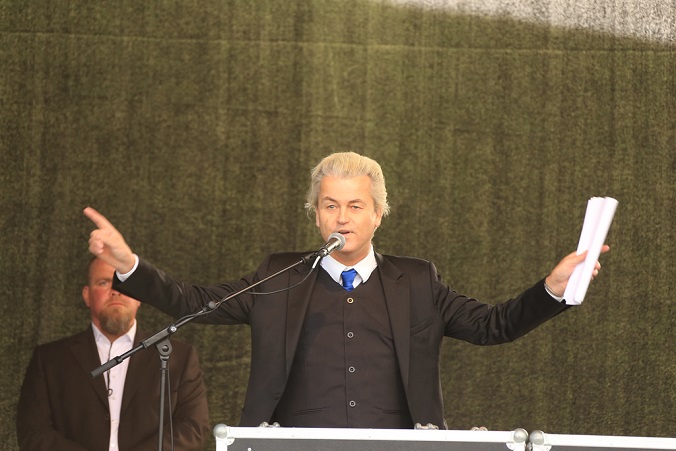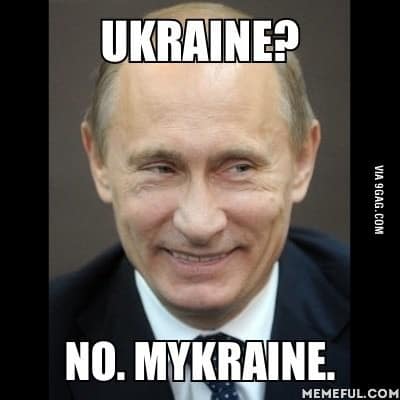Some years ago, the Netherlands created a law that allows citizens to demand a referendum if they collect enough signatures. GeenStijl, a media platform which has grown famous by publically insulting people and inventing hoaxes, set up a campaign (named GeenPeil), and managed to go well over the threshold of 300 000 signatures. The issue: the trade agreement of the EU with Ukraine was signed without consulting EU citizens, and this is an example of EU imperialism citizens do not necessarily agree with. Therefore, we should be allowed give a vote of council on the agreement. It will take place on the 6th of April.
The campaign opened a Pandora’s box of citizen frustrations over social media. They complain about EU’s democratic deficit, chicken unfriendly Ukrainian industries, unfair competition, Monsanto and Shell, Ukrainian war and corruption, stigmatizations of the initiator of this referendum Jan Roos, about being influenced by propaganda and about several more issues. Since I’m amazed by some of the things I’m reading, I feel the need to give my views on the issues raised, and the state of the EU.
The Ukrainian Situation
As we all know, the history of Ukraine is complex. It has been a borderland for centuries, has known many bloody episodes, particularly during the world wars, and has only become a sovereign state in 1990. The western, and most powerful part of Ukraine has been wanting to sign a trade agreement with the EU and got really close to it in 2014. When the Ukrainian leader Viktor Yanukovych backed away from this plan, he was removed from power, and the recent revolution unfolded. Today, most of the Ukrainians still want this agreement signed. It will likely provide them a bit of structure and bargaining power against powerful local players, despite the fact that there is almost no hope for real stability in the coming decades. Of course, strong ties to Russia remain, as the Federation has played an important role in Ukraine’s history, and will continue to do so. If guided peacefully, this may be no problem.
EU Values
The main reason why most Ukrainians want to team up with the EU, is that the EU represents a set of humanitarian values, market structures and legal frameworks that, if correctly implemented, would highly benefit stability. Paradoxically, these are the same or similar values that many of the Dutch No-voters contest. That’s because they supposedly benefit big market players and politicians while undermining the power of the people.
The discussion on the question if the EU still adheres to these values gets complicated by media-popular topics such as the refugee crisis and terrorism. These issues attract debaters who have no insight in politics or legal frameworks, but feel disadvantaged or manipulated by the system. They bring in observations which might be valid, but interpret them in a way that is in my view overly accusational to the European regime. I am not an expert on these frameworks either, but it seems to me that when it comes to quality of life, human freedom and values and economical stability, the European model still works quite a lot better than the Russian one. But of course, we can not all always get what we want, and Greece certainly is a victim we can’t ignore. But I also trust that the EU is working on ways to resolve the issues, precisely because the EU values are central to the union.
The Reputation of Geen Peil
I despise the guys who made this referendum happen (particularly phony Jan Roos), but have to give it to them: they’ve made themselves heard, and have drawn attention to a set of important issues of Europe and, perhaps, the entire West. There is a thing that bothers me here, though.
On the one hand, the Geen Peil leader propagates that we have to make ourselves heard to save democracy. But at the same time, his team spreads faulty information, populist claims, to direct people into voting No. Some examples: ‘this agreement is a step to expansion of EU territory’, ‘the agreement decreases our democratic power’ and ‘this will open a migratory stream from Ukraine towards western Europe’. All are proven untrue. It is not surprising that they do this, because lying is what has built this group’s fame, but I still find it somehow creepy to see a media group build political power on plain bullshit. And of course they’re backed by Geert Wilders. It would suit Geen Peil better if they would stick to: ‘have your voice heard’, instead of the – sometimes subliminal – ‘vote no’ on their social media outlets.

“Most conventional media say: vote yes”
There are many social media discussions going on about the question why the regular media pay so little attention to the no voters’ arguments. People are describing this as suspicious national propaganda to vote yes.
For what I’ve seen, most, not all, conventional media indeed advocate yes over no. Propaganda is one explanation, but that doesn’t explain why the new, independent, crowdsourced medium ‘The Correspondent’ also advocates a yes. Another explanation is that if you filter out the bullshit, and look for proper sources, voting yes is just a more sensible thing to do. And a third explanation is that the other media hate Jan Roos as much as I do, and collectively try to undermine his plan. Personally, I think it’s the second one. The bottom line is that the fact that all conventional media agree doesn’t make it propaganda. And bloggers are not necessarily right if they claim the opposite.
Environmental consequences
As I’m in the environmentalist scene, I have seen many social media contacts make claims about Ukraine being a great EU backdoor for Monsanto and a good way to get non-animal friendly meat from Ukraine on our markets. Though I haven’t gone into depth of these issues, the claims are probably true. They fit in the narrative of Ukraine corruption and humanitarian instability. Would that be a convincing argument to say no? The yes camp tends to oppose the statement by claiming that a trade agreement would help implement better standards for food production in Ukraine. I think this is probably true as well, but not for the coming decade.
But more importantly, this is a different discussion. These issues are not so much centered around the agreement with Ukraine itself (though certainly influenced by it), but around a far larger problem of market control by big companies, and large agreements such as TTIP. It shows that we need to reform some things, which should happen on a far larger scale. Why is this referendum not about TTIP? Honestly. Who in the Netherlands really cares about Ukraine? As I said earlier, people want to use this opportunity to express a disagreement on the system at large, similar to, for example, the Occupy movement. But they should be patient and address one issue at the time. It seems to me that environmentalists are trying to get their piece of the cake of this discussion.
Putin
And then there is one of my favourite politicians of this time: Vladimir Putin. A friend recently told me he was convinced that the Russians have supported the referendum financially. Not because they care about Ukraine, of course, Ukraine means nothing to Russia. What Putin wants is to divide Europe, so that he can talk with every nation state individually, and with far larger bargaining power. Makes sense, I’d say. He would appreciate a Dutch no vote as a potential step towards European instability.
The impact of this referendum
And then there’s the final, most important question in this matter: how much attention would the Dutch government pay to a no-vote on an agreement that they have already signed? If you ask me, the answer to this question is ‘not much’. There are no signs that they would undo the treaty from the Dutch site, particularly not now that they are president of the EU and trying to make the Dutch political voice heard.
And that’s exactly what Geen Peil wants, to demonstrate that politicians cannot be trusted as representatives of the people. That democracy is false, and that we should somehow claim our rights. Now: of course you can’t trust politicians. They’re politicians! But that doesn’t mean we shouldn’t trust them. After all they are the ones responsible to deal with these issues, that’s what we elected them for. We can go on and on about how they’re not doing what we want, but that’s an incredibly childish way of seeing democracy. As if the politicians are our parents, who have to give us sweets when we desire them. People have wrong desires, and it would be a strong and valid political move to correct a no vote of the people of an insignificant nation as the Netherlands, if it were to arise. This is not our issue.
To me, the ideal outcome is one where no votes. If less than 30% of the Dutch show up on the sixth, then the referendum will be declared forfeit. It would reveal a no-nonsense attitude that I’d highly appreciate, given the silliness of calling a referendum on this particular case. A no would temporarily raise a discussion on the power of democracy in the Netherlands, after which some would conclude that ignoring this council was probably for the better, and others would build further on a populist momentum. And what would happen with a yes? It would perhaps show some kindness of the Dutch people, and encourage the Ukrainians a little? Maybe that would be the best outcome after all.
This blog was previously posted on Giles Havik’s blog: Sailing on dreams



